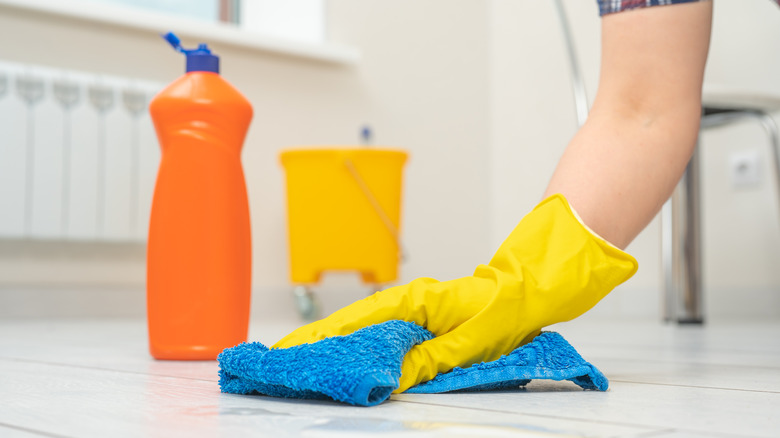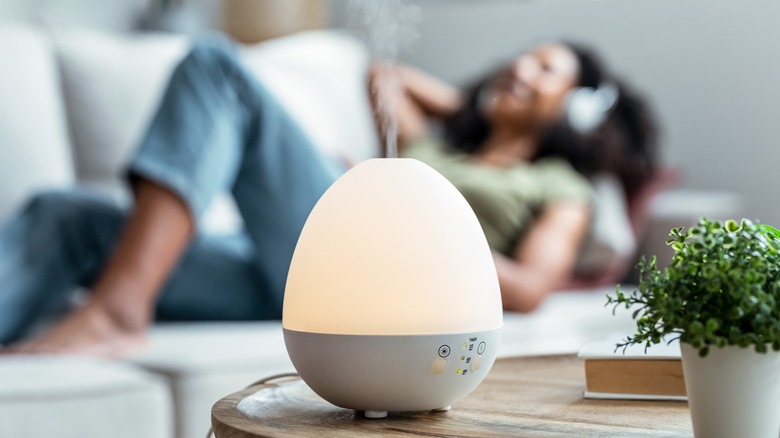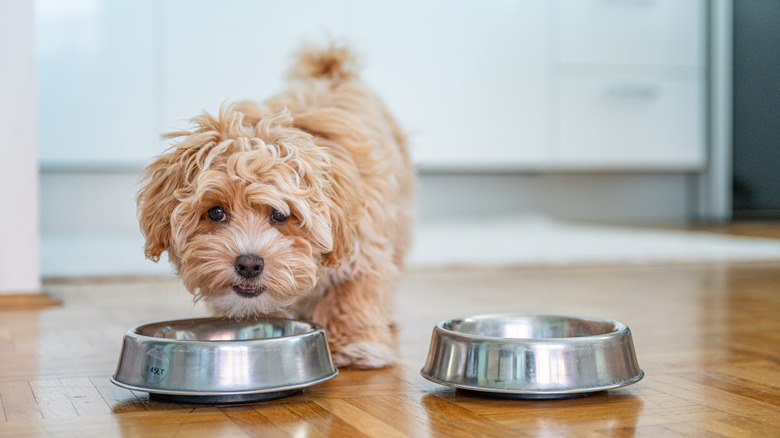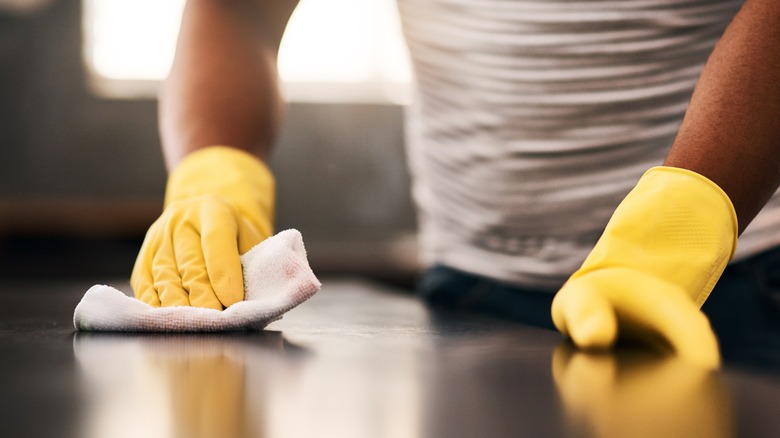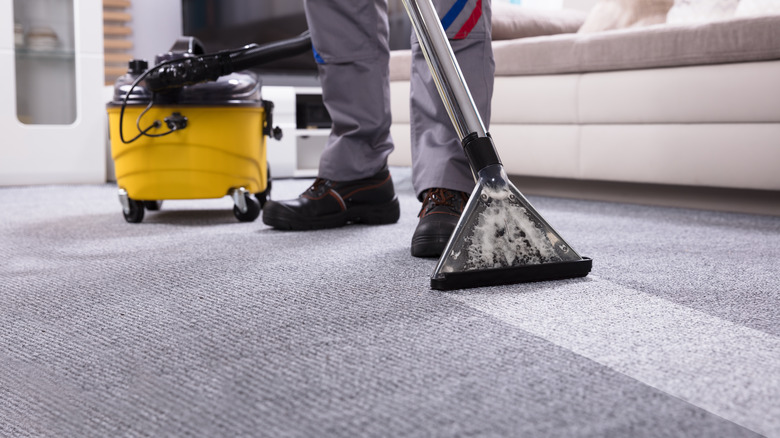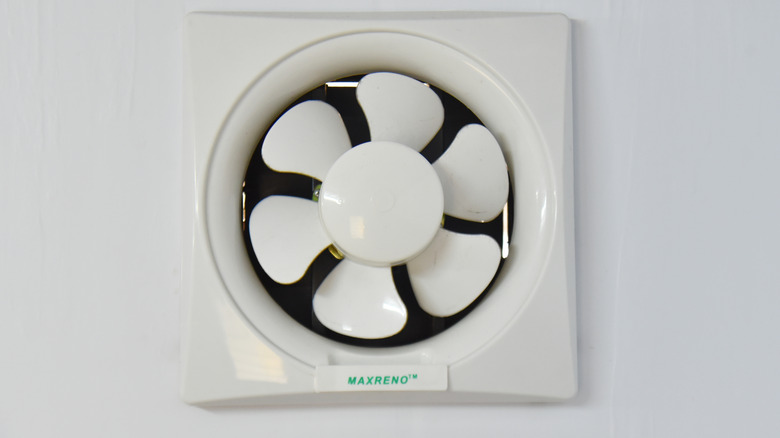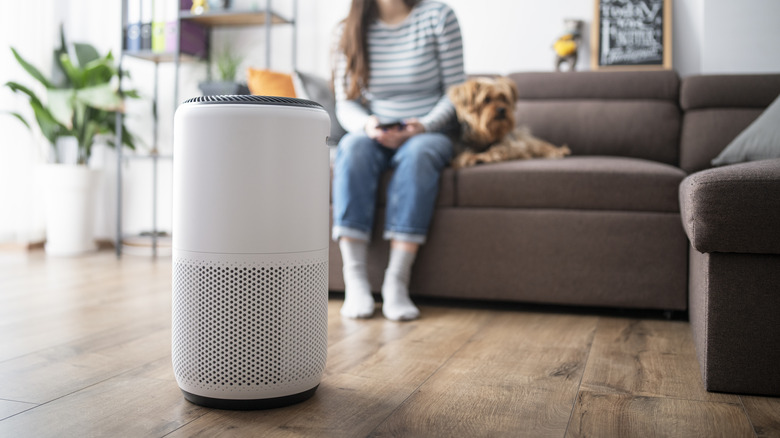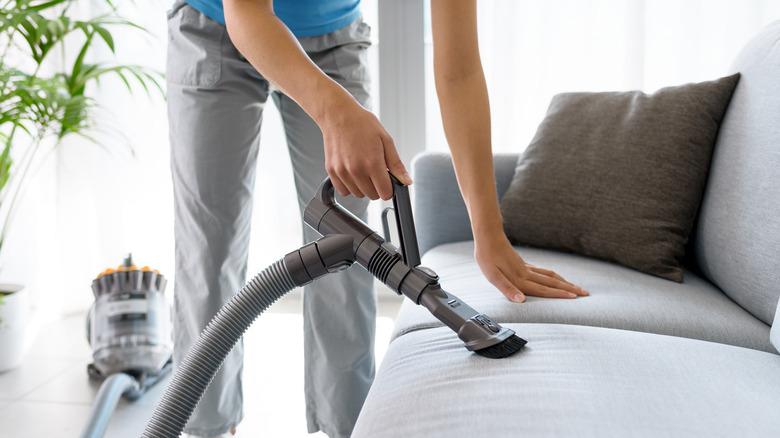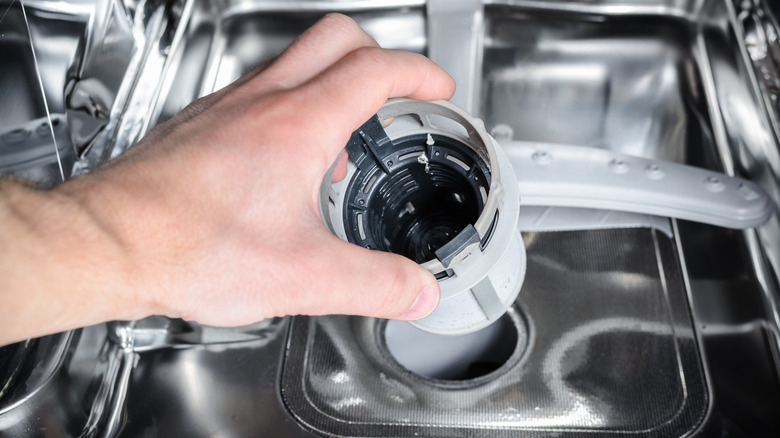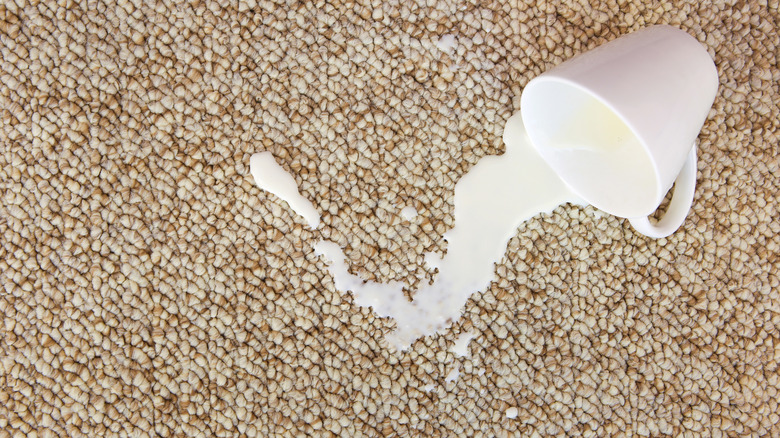13 Small Habits That Will Make Your Home Smell Better Than Ever
Coming home to a pleasant-smelling haven can improve your mood, help you relax, and evoke positive emotions. A fragrant house will also make your guests feel welcome and leave a good impression on prospective buyers if you're hoping to sell. Unfortunately, this often seems like a distant dream since a few innocent mistakes, like smoking indoors and poor ventilation practices, can stink up your abode in no time. While hacks like simmering citrus peels and baking delicious goods will curate a fragrant environment, they're a temporary solution at best. Thankfully, the silver lining is you can adopt a few small habits to make your home smell better than ever.
For instance, avoid lighting cigars, pipes, and cigarettes indoors. Plus, encourage others to follow the same practice. This will help eliminate the source of the smell, as the smoke won't have the opportunity to cling to soft surfaces like cushion covers or area rugs. It'll also improve your indoor air quality. Similarly, cleaning and drying your washing machine's gasket routinely will work wonders. Wondering what other habits you can incorporate into your routine to make your home smell good and fresh every day? Let's get started.
Open your windows for a few minutes every day
An open window isn't just a portal to the outside world. Opening the window every day has practical reasons, too. While you might keep your windows closed for security, noise concerns, or to keep pesky pests out, it's one of the easiest ways to make your home smell better. All you have to do is open the windows for a few minutes daily (yes, even during the cold winter months) to let the stale, musty air out and bring fresh air in.
Unlatching the windows in your home every day will allow the trapped odors in your home to move out. Just imagine the overpowering smell of cooked fish, trash, and sweat getting replaced by a natural scent. This simple exercise will improve your home's ventilation and remove pollutants like CO2, allergens, and cigarette or cigar smoke. Consequently, fresh air circulation and better indoor air quality will allow you to breathe easier. If security isn't a big concern and the weather allows, you can even crack the windows a little at night to sleep relatively better and make your bedroom smell fresher.
Swap out toxic cleaners for natural ones
Although you might associate the chemically-induced strong fragrance of store-bought cleansers with a cleaner home, there's no denying that they often don't make your home smell good. Even if you happen to like the smell of some household cleaners, they're anything but good for your health. Most of these products contain harmful volatile organic compounds (VOCs) and lead to chemical pollution that can irritate your nose, throat, skin, and eyes. They may even induce nausea and headaches. Plus, they aren't safe for your pets or the environment. While a better alternative would be to turn to cleaning products regarded as the Safer Choice (by the U.S. Environmental Protection Agency) or have the GreenScreen certificate, there's no guarantee they'll make your home smell better. They're simply better than their counterparts when it comes to health concerns.
So, instead of relying on mass produced cleaners, you can use household essentials like distilled white vinegar to prepare a green cleaning solution for your home. A natural product like vinegar makes your home smell fresher by neutralizing funky odors. Admittedly, white vinegar has a strong smell straight out of the bottle, but the scent evaporates relatively quickly. You can even add a few drops of essential oil to the cleaning solution to mask the odor of vinegar. Mild dish soap and baking soda are strong contenders, too.
Use essential oil diffusers daily
An essential oil diffuser is one of the easiest ways to make your home smell better than ever. A diffuser will remove foul odors from your environment and make it smell like your favorite fragrance within a few minutes. Besides smelling heavenly, the organic fragrances can also help you feel relaxed, open blocked nasal passage, and facilitate a restful sleep. However, the benefits largely depend on the fragrance you choose. For instance, lavender will reduce anxiety, whereas vanilla will make your space smell amazing and remind you of baked goods. Eucalyptus, pine cones, and citrus are some other good options. You can use two or more of your favorite essential oils for a scent that's all you.
An essential oil diffuser works since it disintegrates your favorite oil into millions of microscopic particles. So, these particles turn vaporous and permeate the surrounding air instantly. The best part is that the vapor spreads out evenly and doesn't overpower your sense of smell. Additionally, they're a safer alternative to candles, especially if you live with kids or pets. You also won't have to scrape the leftover wax from various surfaces. However, choose essential oils from a brand that you've researched to ensure their production process doesn't add synthetics to their products.
Take out the trash daily and deodorize the can
You might wait for your trash bag to fill to the brim before finally taking it out. But the waiting period (even if it's just two to three days) might be enough for the bacteria and microbes to fester and cause triglycerides, amino acids, and other ingredients in your waste to smell awful. The situation goes from bad to worse if the temperatures outside are high and the food has gone bad (or is about to). So, the best course of action is to take out the trash daily to prevent bacteria from feasting on it and making your home smell terrible.
If this sounds too foreign of a concept, keep in mind that it's a fairly quick chore, one you can do during a commercial break. Moreover, make it a point to take out strong-smelling trash – like fish, seafood, and spoiled food — immediately. After you take out the garbage, add items like baking soda, lemon peels, charcoal, or coffee beans to the can before inserting a fresh bag to minimize odors in the future. You can also use peppermint essential oil to make your trash can smell fresh. Another best practice is to clean the can every week or two to keep the offending smells at bay and kill odor-causing germs. However, clean the bin immediately if your garbage bag rips open and the trash spills over.
Regularly clean your pet's habitat, litter box, and food bowl
Your pets might be considered family members, but they also harbor bacteria and other living organisms in their guts (or other body parts). Not to mention the traces of saliva, dirt, dander, fur, and waste they leave behind in their bed, around your home, or litter box. This makes it important to clean these items regularly to neutralize the bacteria and other germs before they multiply. Not only would this be bad for your pet but also make your house smell like a zoo. If your pet plays with toys, cleaning them is vital, too.
To maintain a healthy environment for your pet and other family members, and keep unwanted odors out, the Centers for Disease Control and Prevention recommends cleaning your pet's habitat, blanket, and bed every week. If you serve them wet food, clean the bowl after every meal. Dry food and water bowls should be cleaned daily. As for their toys, aim to clean them monthly. Remember, you can clean these items more often if they get filthy or smell bad. Don't forget to disinfect your pet's litter box as often as you clean your toilet. Clean them more often if your furry friend is sick or someone in your family is susceptible to germs, like older people or young children.
Maintain a spotless kitchen
You might be a pro at cleaning your kitchen and keeping your countertops, cabinets, and stovetop looking new. However, this surface-level cleanup isn't enough to eliminate unpleasant smells from your cooking area. If your seemingly clean kitchen smells bad, it's because you're most likely ignoring the inconspicuous areas like the walls. A victim to food splatters, dirt, and grease, these spaces begin emitting a foul smell given their hot and moist environment. Similarly, overused and dirty kitchen sponges can give off a funky smell if not replaced at the right time.
So, it's important to wipe these hidden spots every time they encounter a splatter. Put on your cleaning gear and vacuum the overlooked spots regularly to get rid of the accumulated debris and dust. In case the smell is unbearable, pour 1⁄2 cup of baking soda in a bucket of warm water and use this cleaning solution to wipe and deodorize the smelly walls. Baking soda's odor-absorbent and abrasive qualities make it the ideal candidate for cleaning kitchen walls. However, conduct a spot test first to make sure your DIY cleaning solution doesn't strip paint.
Get your area rugs cleaned professionally
Rugs are subject to a lot of daily wear and tear. Dirt and dust from outside, pet dander, pollen, and accumulated debris can soon turn your pristine runner shabby and smelly. If left untreated, the smell can permeate every corner of your home and make it musty. It won't just be an unpleasant experience for your nose. The captured dust mites can also cause athlete's foot, rashes, and itchy skin. This makes it important to get your rug deep cleaned (shampooed) to remove the odor, restore its luscious look, and prolong its lifespan.
However, the frequency of these deep cleans will depend on the rug's location, the amount of foot traffic it receives, and the type of home it's placed in. For instance, a living room rug in a family with kids and pets will require more frequent cleaning than one set in an adult's bedroom. A rule of thumb is to schedule two shampooing sessions annually for your runner if you've got kids and three to four times if you've got pets, too. If you're prone to allergies, get your rug deep-cleaned every quarter or so.
Similarly, light-colored rugs require more frequent cleaning than dark ones. Don't forget to vacuum both sides of the rug once or twice every week to maintain its clean appearance.
Use the exhaust fan in your kitchen and bathroom religiously
The exhaust fans in your bathroom and kitchen might not be your favorite feature, given their noise, but they're one key to making your home smell better. Imagine cooking seafood and your entire house smelling like a fish market for a good chunk of the day. Or using the bathroom, only to caution everyone else to avoid the room until the smell dissipates. Well, the exhaust fan is the answer to all of these problems. Just turn it on every time you cook or have to finish some unsavory business in the toilet.
Since the fan replaces the existing air in the room with fresh air, it speeds up the removal of unpleasant odors from your house. Eliminating odor-causing particles at the source prevents them from lingering around your home and settling in soft surfaces, like upholstered furniture and rugs, making them smell funny. Another benefit is running them while taking a shower, which will eliminate the moisture from the bathroom and prevent mold from setting up shop. It'll also improve the ventilation of the space and constantly remove pollutants. Remember to keep the fan clean – mild dish soap and warm water are enough for the job — for an optimal experience every time.
Run the air purifier every day
If your home has a musty or chemical-like odor and you aren't sure of the source, just run an air purifier. It's an excellent way to keep your home smelling clean since the nifty appliance doesn't just mask bad odors. It eliminates the pollutants responsible for the smell. In fact, you should keep it on all the time, especially if you can afford it. However, if that's not an option, try running it for a few hours every day to keep your indoors fresh and air quality high.
But keep in mind that their efficacy depends on the type of filter they come with. For instance, air purifiers featuring a HEPA (high-efficiency particulate air) filter might remove up to 99.97% of contaminants from the air, including pollen, dust, and bacteria. This makes them ideal for households that constantly deal with such allergens. Conversely, a purifier outfitted with a carbon filter absorbs odors and pollutants from the room. But you should invest in them only if the amount of carbon in the filter is substantial. Moreover, your purifier should have an efficiency rating (clean air delivery rate) that's at least ⅔ of the room's size to function effectively. Clean your air purifier monthly to ensure it works like a charm for years.
Keep your couch covers fresh
A couch is one of the most loved furniture pieces in the home. As such, dead skin cells, dust, pet hair, accidental spills, and random food debris can turn it dirty in no time. If not cared for adequately, your beloved piece will develop a foul odor and cause your house to smell. Luckily, you can avoid this by keeping your couch covers clean and fresh. Begin by vacuuming the covers and removing surface-level dirt and the accumulated debris. After that's done, unzip your cushion covers (if they can be removed) and check the laundry code before popping them in the washing machine.
It's a good practice to deep clean the covers twice a year (or more, depending on how dirty they get). But vacuum them every week to maintain their clean state. In case you can't remove couch covers, invest in an item like Bissell's Little Green Machine or similar upholstery cleaner. Cleaning your couch covers regularly removes set-in odors, leading to a fresher smelling sofa and room.
Clean your dishwasher's filter routinely
Most dishwashers have a filter at the bottom to catch rogue food particles. Fortunately, cleaning your dishwasher's filter is extremely simple and requires no special products. The first step is to locate the filter. You'll likely find it under the last rack in your machine in one of the corners or near the bottom of the spray arm. Once you locate it, take out the upper and lower parts of the filter. Now, run the filter components under running water to remove the stuck debris. You may also use a mild dish soap and a gentle brush to remove the stuck particles. Once they're both clean, fit the lower component before securing the top portion. Ensure they're both tightly secured and aren't turning, or it could damage your appliance. Clean the filter regularly to avoid the stench.
The frequency of cleaning the filter depends on how much you use it, the amount of debris accumulated, and how robust the filter is. If you use the dishwasher often and the debris accumulation is substantial, follow the same procedure to clean out the filter every quarter (or twice a year). Similarly, if you don't use the dishwasher much, the filter is especially robust, and you wash the dishes before loading, an annual clean may suffice. Cleaning the dishwasher filter gets rid of any old food debris that could make your home smell bad.
Keep your fridge odor-free
A refrigerator is an indispensable appliance for homeowners. Still, most of us don't clean out the interiors often enough, including immediately wiping up accidental spills. But odor-causing bacteria love it! Spoiled food and a dirty environment help bacteria breed and take over the interior of your fridge, making it smell. This will, in turn, stink up your home every time you open the door. Luckily, you can remove funny smells from your fridge by keeping it clean. The first step is to unplug the appliance, check the items inside, and throw away anything past its prime. Then empty the shelves and deep clean your fridge with a warm water and dish soap (or detergent) cleaning solution.
After you're done, leave the doors open for at least 15 minutes to allow the stale and smelly air to come out. This should take care of the most offending smells in your refrigerator. If the smell persists, use activated charcoal, baking soda, or another item to get rid of the funky odor. Once your fridge smells fresh again, develop a habit of wiping up spills immediately, check food expiration dates, and deep clean your fridge every three to four months. However, if your device emits a chemical-like smell, it could indicate a Freon leak and should only be handled by a professional.
Don't let spills settle in carpets
Often placed in high-traffic areas, rugs are susceptible to spills, including food and beverages. These spills won't just leave behind unsightly stains but also facilitate odor-causing bacteria to run rampant and stink up the space. Moreover, unattended stains will also attract mold and mildew, which will smell unpleasant. So, it's best to clean spills as soon as you notice them to keep them from settling into carpet fibers. While the cleaning method will depend on the type of spill, start by blotting it.
Use a paper towel (or microfiber cloth) to gently blot (don't rub) the stain and prevent the spill from settling into the carpet fibers. If you act immediately, this step should help you get most of the stain out. But if it isn't enough, you'll have to concoct DIY cleaning solutions using vinegar, dish soap, or hydrogen peroxide based on the nature of the stain. As for the lingering odor, sprinkle some baking soda over the stains and let it sit undisturbed for some time (or overnight) before vacuuming it. You should also take care of spills elsewhere in your home, including your bed linens, window covers, and throw pillows. By not allowing spills to settle in, you're giving the resulting odors less chance to start to begin with, increasing the chances for a fresher smelling home every day.


